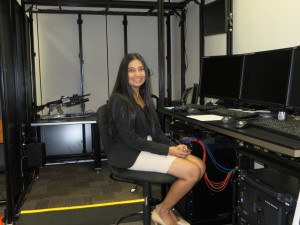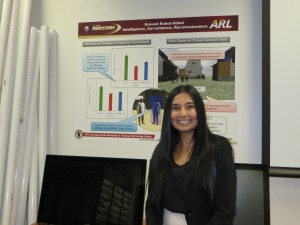Every morning, Crystal Maraj pulls up to work in the sprawling research park next to the University of Central Florida. There, deep inside the bowels of UCF’s Institute on Simulation and Training, she is working on a U.S. Army project, studying how simulated, computer-based training can be improved – and aid soldiers on the battlefield.
Maraj – who recently earned her doctorate in psychology – started her college career at Valencia, where she set out to study psychology. But she never dreamed she’d end up studying soldiers and battlefield training.

What brought Crystal to Valencia was a shocking wave of violent crime in her home country, Trinidad and Tobago. Almost 10 years ago, after kidnappings and murders became common-place events, Crystal Maraj’s family packed up and left the islands. They headed to the United States, not sure what they’d do with their lives. With an aunt living in Oviedo, Crystal’s mother and stepfather decided to settle in Orlando – where the climate was similar to that in the Caribbean.
Although Crystal’s mother and stepfather did not attend college, they stressed the importance of education. So Crystal, who had just completed prep school on the island, began exploring colleges. “We lived near East Campus, so I looked at UCF,” recalls Crystal. “But I was a small-island girl, so coming to a big campus like UCF was intimidating. I liked Valencia best. The classrooms are small and I could interact with the professors.”
Crystal already knew she wanted to study psychology, so at Valencia, she delved deep into developmental psychology and abnormal psychology. Yet a funny thing happened to this psychology major. While taking classes at East Campus, she discovered a passion for statistics. At Valencia, her statistics professors challenged her and she lived up to their expectations, earning high marks and becoming a member of Phi Theta Kappa, the honor society for students at two-year colleges.
After earning her Associate in Arts degree from Valencia, she transferred to UCF, where she continued studying psychology and statistics. Still, the move to UCF required some adjustment. “The classes at UCF were three to four times the size of the classes at Valencia,” she recalls. “You were just a face in the crowd. And at UCF, after class, if you wanted to talk to the professor after class, you might be number 27 in line.”
Nevertheless, Crystal pushed herself. On the side, she worked at a psychologist’s office in Winter Park, but after a few years, she concluded that working in mental health and counseling wasn’t her thing.
So she poked around at UCF and landed a research assistant post at the Institute for Simulation and Training, working in the Team Performance Lab. There, she discovered how much she loved the human-factors side of psychology. Human-factors psychologists study how humans interact with machines and technology. They also study human traits and capacities like vision, attention and decision-making to help design machines and systems people can use correctly, safely and comfortably.
“You know, I didn’t feel like I stood out at UCF – until I found myself at IST. There, I felt comfortable – and that’s very important,” she says. “You have to be comfortable in your school, in your work. “ Through IST, her sponsors paid for her tuition and gave her a job, where she worked 20 hours a week. That, she found, was her ticket to grad school. But most important, she said, was finding mentors. “It’s nice to have people who believe in you,” she added.

One of those was Dr. Stephanie Lackey, former associate professor at UCF and director of the ACTIVE lab at UCF.
“Crystal is just a wonderful person,” says Dr. Lackey. “It was truly an honor to have her study under me. She is so persistent and really embraces academic rigor in a way that’s difficult for most students to conceptualize.”
Equally important, says Lackey, was Crystal’s willingness to seek advice. “Every once in a while, she would come to me and say, ‘I’m feeling confident about these things and I’m not feeling confident about these things – do you have any advice?’ “
And that kind of openness, says Lackey, who is director of federal solutions at Design Interactive, helped her develop a friendship and mentor relationship with Crystal.
After earning her master’s degree in psychology, Crystal began applying to doctoral programs around the country – including human factors Ph.D. programs at George Mason University and Old Dominion University in Virginia – but she elected to stay at UCF and study modeling and simulation.
“I was already publishing (research) at the Team Performance Lab,” she said. “It showed people that I was capable of doing Ph.D. work.”
Besides, in modeling and simulation, she could work in many disciplines – psychology, engineering or education. “I thought, ‘Wow, I can study almost anything.’ So that appealed to me more than going to Virginia,” said Crystal.
After two years of hard work, Crystal earned her doctorate this spring. Now as Dr. Crystal Maraj, she is looking forward to a career in a rapidly expanding field –and in five years, hopes to have her own research lab or be a government contractor.
Crystal set her sights high – in part because her older sister, Tralisa, is the chief financial officer for a major oil company in Houston. “My mom instilled the value of education in us,” says Crystal. “She told us that we need to be self-sufficient.”
But she is also inspired by her parents’ sacrifice. “Having to uproot your life for your children – leaving behind uncles and aunts and family – leaving all of that behind is tough,” she said. “But because of them, we are successful.”
